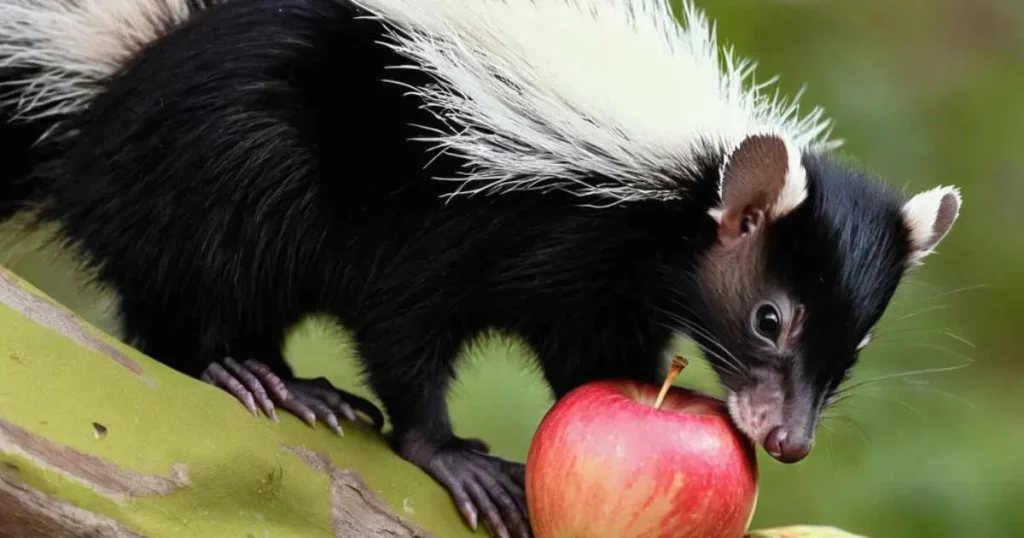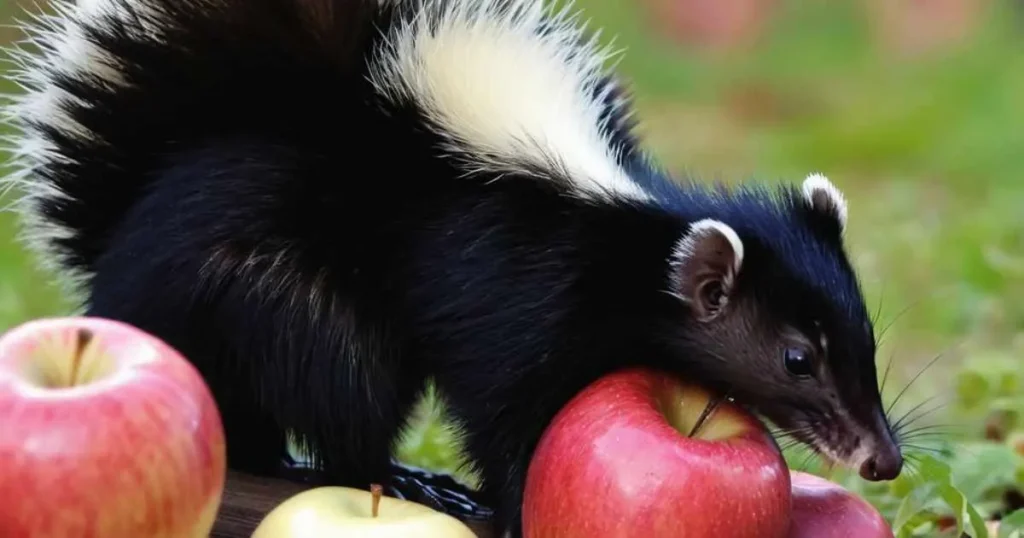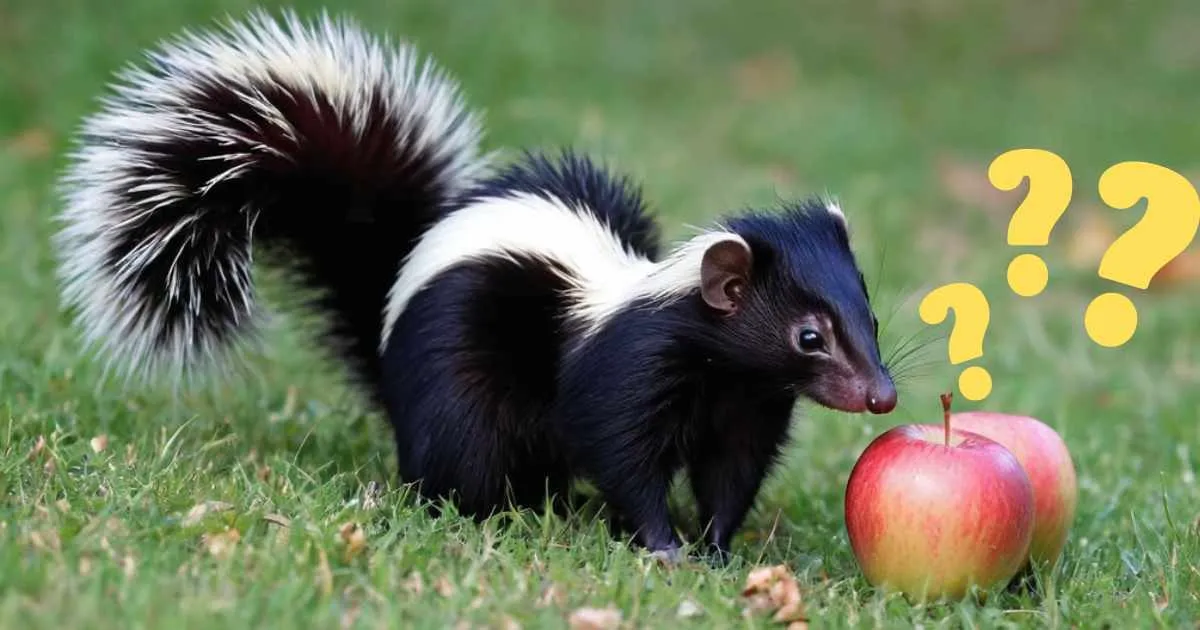Do Skunks Enjoy Eating Apples? Find Out
Last updated on November 4th, 2024 at 06:43 am
Do skunks munch on apples? Absolutely! From my experience as a skunk pet owner and wildlife observer, I’ve seen how much they enjoy these sweet treats. Skunks have a diverse diet, and apples provide them with essential vitamins. For those who spot skunks foraging in their yards, it’s helpful to know what draws them in. Read on to find out more about skunk feeding habits and learn practical tips for managing your garden’s nocturnal guests while ensuring harmony with these fascinating creatures.
The Skunk’s Diet
Skunks are not just famous for their defensive spray. These creatures enjoy a diverse diet, which often leads them to our backyards. The question is, do they eat apples? Let’s dive into what skunks typically consume.
Natural Food Sources
Skunks have a nose for various foods in the wild. Their natural diet includes:
- Insects and larvae
- Small rodents
- Fruits like berries and yes, apples
- Grubs and worms
- Eggs from birds and reptiles
Omnivorous Behaviors
Skunks are omnivores. This means they eat both plants and meat. A skunk’s diet changes with the seasons. In the table below, see what skunks prefer during each season:
| Season | Food Preference |
|---|---|
| Spring | Insect-heavy |
| Summer | Fruits and small mammals |
| Fall | Nuts, seeds, and available fruits like apples |
| Winter | Carrion and stored body fat |
In gardens, skunks may encounter ripe apples. If apples are within reach, skunks will likely indulge. They have a sweet tooth, and ripe fruit offers easy nutrition. So, back to the original question, skunks do eat apples when available.
Apples In The Wild
Have you ever wondered if wild animals enjoy the same snacks we do? Surprisingly, skunks are creatures with a taste for variety, and apples are on their menu! In this section, let’s discover what makes apples crucial to skunks in the wild. We will explore their availability and how these animals adapt their eating habits to the seasons.

Availability Of Apples
Apples are a fruit loved by many, including our striped friends, the skunks. These fruits often fall off the trees in rural gardens and natural orchards, becoming accessible snacks for wildlife. Abundant in many temperate regions, apples provide a valuable source of nutrition to skunks roaming in the wild.
| Location | Availability |
|---|---|
| Orchards | High |
| Backyard Trees | Moderate |
| Forest Floors | Low to Moderate |
Seasonal Eating Patterns
Seasons change, and so do skunks’ feasting habits. During autumn months, apples are ripe and plentiful, becoming a favorite choice among skunks. They consume these nutritious treats to build up fat reserves for the winter. In winter, they rely more on other food sources like insects or small rodents, as apples are not easily found.
- Spring – Skunks search for newborn plants and insects.
- Summer – They enjoy a diverse diet including fruits, like apples.
- Fall – Apples become a primary food source.
- Winter – Skunks adapt to a more scarce food supply.
Skunks’ Foraging Tactics
Skunks are not picky eaters, and they will happily snack on a variety of foods. One surprising item on their menu is apples. Yes, these furry creatures enjoy fruits too! Understanding how skunks forage helps us better appreciate these often misunderstood animals. Let’s dive into the ways skunks search for their food including those juicy apples.
Nighttime Foraging
Skunks are nocturnal animals, meaning they search for food at night. Their black and white coloring might stand out during the day, but it blends into the shades of the evening. Under the cover of darkness, skunks hunt for meals with less risk from predators. They rummage through gardens, orchards, and underbrush, using their keen senses to find tasty treats like apples.
- Quiet Approach: Skunks move stealthily, avoiding loud noises that might alert others.
- Focused Search: They target areas with known food sources, like apple trees.
Sense Of Smell In Food Detection
While skunks have poor eyesight, their sense of smell is remarkable. This guides them to hidden fruits, including fallen apples. Their noses lead the way as they sniff out ripened apples among leaves and grass.
| Foraging Skill | Description |
|---|---|
| Digging | Skunks use their claws to dig for food underground. |
| Sniffing | They rely on their noses to locate food above ground. |
By tapping into their natural behaviors, skunks can enjoy a varied diet, including the sweetness of apples. Their foraging tactics are a testament to their adaptation and survival abilities in the wild. Next time you spot a skunk, remember, that there’s more to these creatures than their notorious spray; a resourceful forager is exploring the world one sniff at a time.
The Appeal Of Fruits To Skunks
Imagine a little skunk wandering through an orchard. What catches its eye? Apples! Skunks are known for their unique diet. Fruits are a big part of it. They love to snuggle up and munch on an apple. Apples are sweet, easy to find, and full of good stuff!
Nutritional Value Of Apples
Apples are like a superfood for skunks. They hold water, fiber, and vitamins. Vitamins like A and C keep skunks healthy. A skunk can eat an apple and feel good!
| Nutrient | Benefit |
|---|---|
| Vitamin A | Good for eyes |
| Vitamin C | Keeps skin healthy |
| Fiber | Helps with digestion |
| Water | Keeps hydrated |
Food Preferences
Skunks have diverse tastes. They eat bugs, small rodents, plants, and fruit. Fruit is a favorite, especially apples. Skunks find apples delightful to their palate. They are easy to bite and chew. This makes apples a top choice for a skunk’s meal.
- Skunks eat a variety of foods
- Fruit is a top pick
- Apples are especially loved
Tasty, nutritious, and refreshing, apples have it all. That’s why skunks will often choose an apple for their snack.
Human-skunk Interactions
Human-skunk interactions often involve moments of surprise and curiosity. These black-and-white creatures, known mostly for their pungent defense mechanism, also have varied diet preferences. While not typically a go-to snack for these mammals, apples could indeed be on a skunk’s menu. In this post, we’ll look at how these interactions occur and what they entail for both humans and skunks.
Backyard Encounters
Imagine taking a step into your garden to the sight of a skunk. This unexpected guest might be there for a few reasons. Skunks are naturally drawn to areas with readily available food sources. Your backyard could offer this in many forms.
- Leftovers: Compost bins or scattered pet food can attract skunks.
- Shelter: Skunks often seek out quiet spaces like sheds or woodpiles.
- Water sources: Ponds and birdbaths can provide necessary hydration.
Knowing this, you might catch a skunk nibbling on fallen fruits, such as apples, during their nocturnal forays.
Feeding Habits And Domesticated Skunks
When it comes to skunk diets, wild skunks are opportunistic eaters. They typically indulge in apples if they stumble upon them. In contrast, domesticated skunks might have apples as a part of their controlled diet. Pet owners may introduce fruits like apples to their diets, keeping proportions small to prevent digestive issues.
| Food Type | Wild Skunk | Domesticated Skunk |
|---|---|---|
| Insects | Common | Occasional |
| Small Rodents | Common | Rare |
| Fruits | Seasonal | Included in diet |
| Vegetables | Rare | Common |
In conclusion, whether wild or domesticated, skunks may enjoy apples as a treat. Remember, wild skunks should not be fed intentionally as it can lead to dependency and alter their natural behaviors.
Adverse Effects Of Improper Diet
Skunks are curious creatures, often rummaging around for food. People ask, “Do skunks eat apples?” Yes, skunks may eat apples, but their effect on their health deserves attention. Let’s delve into what happens if skunks don’t eat right.
Health Risks Of Skunks Eating Apples
Feeding apples to skunks can cause trouble. Skunks need a mix of protein, fruits, and veggies. Too many apples can lead to:

- Upset Stomach: Skunks could get tummy aches from too much fruit.
- Nutritional Imbalance: Eating lots of apples can mess with a skunk’s diet balance.
- Dental Problems: Sugary fruits could harm their teeth.
- Obesity: High sugar can make skunks overweight.
Balanced Diet Importance
A balanced diet is key for a skunk’s health. Skunks thrive on:
| Food Type | Benefits |
|---|---|
| Proteins (insects, eggs) | Builds muscles, aids growth |
| Fruits (in moderation) | Provides vitamins, aids digestion |
| Vegetables | Supplies minerals, boosts health |
Keeping apples as a small part of their diet is best. This ensures they stay happy and healthy.
Conservation And Protection
When thinking about skunks, many may not consider their diets. These small mammals are known for their savory appetite for various foods, including fruits. Apples can fall into their diet, but what does this mean for conservation and protection efforts? Let’s delve deeper into the topic.
Impact Of Feeding Wild Skunks
Feeding wild skunks might seem like an act of kindness, but it can have unintended consequences. Such actions can lead to:
- Dependency on humans for food
- Skunk overpopulation in residential areas
- Increased human-skunk conflicts
- Health issues in skunks due to an unnatural diet
These factors can harm both skunks and the community. They highlight the need for proper wildlife feeding practices.
Ecosystem Balance
Skunks play a vital role in keeping ecosystems balanced. They help control insect and rodent populations. If skunks rely too much on human-provided foods like apples, their role might change. This dependence can lead to:
| Impact | Explanation |
|---|---|
| Less natural prey control | Skunks may hunt fewer pests. |
| Diet imbalance | Health issues from not eating a natural diet. |
| Disrupted food chains | Other species can be affected indirectly. |
Ecosystem integrity is key to the survival of multiple species. We must ensure we do not disrupt it by altering skunk feeding behaviors.
Learning From Wildlife Experts
Many wonder about skunk dietary habits. Do they fancy a crunchy apple? Wildlife experts shed light on the matter, offering a unique glimpse into skunk cuisine.
Research On the Skunk Diet
Recent studies provide insights into what skunks eat.
- Skunks are omnivores, enjoying both plant and animal sources.
- Varied diet: Insects, small rodents, berries, and nuts.
- Apples and other fruits are part of their menu when available.
Experts found that skunks don’t actively seek out apples. Yet, they won’t pass up a fallen one.
Advice For Fruit Tree Owners
Fruit tree owners often seek ways to keep skunks at bay.
| Tips | Benefits |
|---|---|
| Collect fallen fruit | Lessens attractants for skunks |
| Install fencing | Physical barrier against wildlife |
| Use motion-activated lights | Scares skunks away at night |
Keep your garden skunk-free and your apples high up on the tree. Secure your trees and enjoy your harvest.
Frequently Asked Questions
Skunks enjoy a variety of fruits, with berries and apples being among their favorites. These fruits are often part of their natural diet in the wild.
Skunks enjoy a varied diet that often includes insects, worms, berries, and small rodents. They also favor grubs and fallen fruit from trees.
Avoid feeding skunks chocolate, caffeine, alcohol, onion, garlic, and salty, sugary, or processed foods to ensure their safety and health. Stick to their natural diet and veterinarian-approved pet foods.
Conclusion
Wrapping up, it’s clear that skunks have diverse diets. Apples do make their menu when available. While not their top choice, these critters won’t shy away from a juicy apple. Remember, keeping fruit waste secured limits unwanted skunk visits. Stay informed and manage those pesky encounters effectively!

